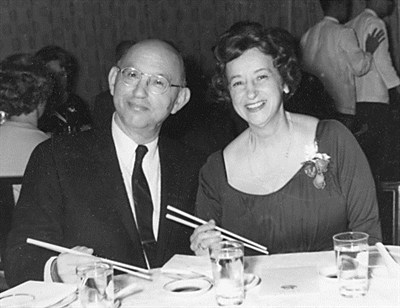 Gus
Jerome Solomon
Gus
Jerome Solomon
The Gus J. Solomon Inn of Court carries on the traditions of a
diligent, able, energetic and colorful lawyer and judge. We recall
the longest serving federal judge in Oregon history and namesake of
the Gus J. Solomon U.S. Courthouse in Portland, Oregon. We value
that Judge Solomon was dedicated to social justice and to a vision
of a bar devoted above all to serving the common good. We, too,
want attorneys to make a difference, not just careers. In pursuing
Judge Solomon's ideals, we advance democratic and egalitarian
principles and actively foster a membership diverse in race,
ethnicity, sexual preference, and income.
Judge Gus Jerome Solomon was appointed by President Harry Truman
to the U.S. District of Oregon court in 1950, and served as Chief
Judge from 1958 to 1971. He continued to hear cases as a senior
judge until his death in 1987. Philosophically, Solomon opposed
narrow conservatism in Oregon and the bar and any denials of civil
liberties or equal opportunity. He wanted the law used to advance
human rights, not just protect property rights, and lawyers to
participate in democratic grass-roots movements.
Anti- Semitism (reappearing during his judicial nomination) and a
Depression drove the Portlander in 1929 into a struggling legal
practice for small businesses and fellow Jews. His calling was as a
"cause" lawyer, mainly for public power and the American Civil
Liberties Union. He was its local appeals counsel in the landmark
DeJonge v. Oregon, 299 US 353 (1937), and helped to win a rare
unanimous U.S. Supreme Court decision. That influential case
continues to be relied upon in all levels of federal and state
appellate courts today, including in another recent landmark
decision, McDonald v. City of Chicago, 130 S Ct 3020 (2010).
As a lawyer, Solomon quickly became a devotee of Jewish political
and charitable interests. He labored for equal opportunities for
Jews, African-Americans, and others in and out of his profession.
He informally helped end both Portland law firms' discrimination in
hiring and promoting Jews and women and local social clubs' bans on
Jews. During the Depression, he was a key leader in the move to
establish the Legal Aid Society, that opened in Portland in
1936.
Judge Solomon was proudest of protecting the rights and
opportunities of political and racial minorities and modernizing
District Court administration. His legacy includes a number of key
civil rights decisions. In 1972, Judge Solomon ruled in Falkenstein
v. The Department of Revenue for the State of Oregon, 350 F Supp
887 (D. Or 1972) that the Portland Elks Lodge could not receive
state tax exemptions because of its racially exclusive membership
policies. He ruled in Henderson v. State of Oregon, by and through
the Bureau of Labor, 405 F Supp 1271 (D. Or 1975) that Oregon
discriminated against women by using different life expectancy
tables for determining their retirement benefits. And in one of the
earliest gay rights cases, Burton v. Cascade School Dist. Union
High School No. 5, 353 F Supp 254 (D. Or. 1973), he overturned as
unconstitutionally vague an immortality statute used to fire a
homosexual teacher.